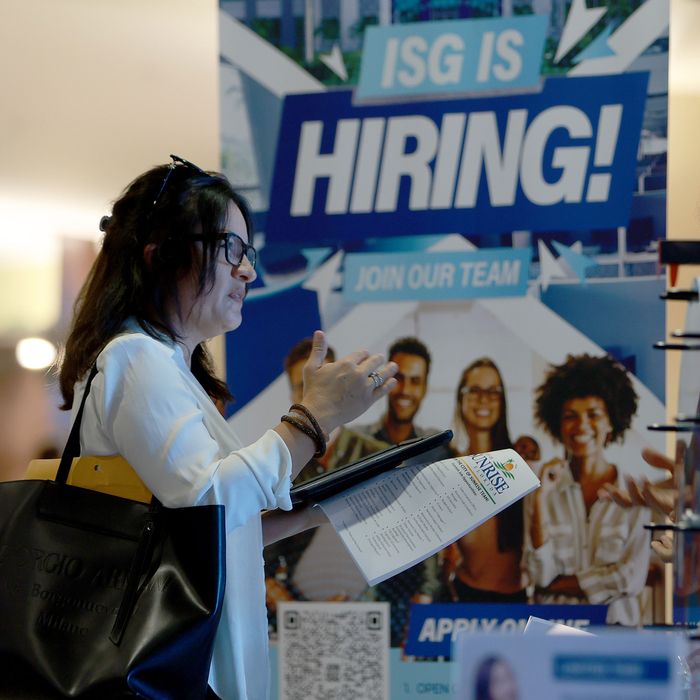
In June, as inflation raged to its highest levels in decades and the Federal Reserve kicked its money-destroying interest-rate hikes into high gear, businesses throughout the country did something weird: They went on a hiring spree. That month, employers added 372,000 jobs, keeping the unemployment rate at a solid 3.6 percent — much more than what economists expected — according to numbers from the federal government. They also paid people more: another ten cents an hour on average than they had in May. Taken on their own, that is all indisputably good news.
Glowing employment numbers aren’t enough, though — not in an economy still wracked by the ongoing pandemic, global war, trade disruptions, and nearly two years of unprecedented stimulus. The mood on Wall Street is dour, and these kinds of expectations tend to have an outsize effect on how economies rise and fall. “Recession remains very much a reality and it’s very easy for an economy to talk itself into recession,” Kroll chief strategist Chris Campbell said in a note. “Talk of difficult times ahead undoubtedly has a chilling effect on consumer spending and investment decisions. I can tell you all I’m hearing from all my clients is a negative outlook in the quarters ahead.”
So how do we make sense of these good jobs numbers while everybody is bummed out about the economy? The answer, in part, is that we can have too much of a good thing, at least from the Fed’s perspective. Low unemployment, even after the Fed has started to raise borrowing costs at the fastest level in decades, means that the economy is still running hot, and that’s driving inflation higher. There were still more than 11 million job openings at the end of May, about double the number of unemployed people in the U.S.
And there is not really evidence that good jobs numbers are making people feel good about the economy anyway. Earlier this week, for instance, the Fed released minutes from last month’s meeting, when it hiked rates by the most it had since 1994. The minutes showed that a poor consumer-sentiment survey had hung over its decision to get more aggressive and that it would probably increase rates at that elevated level, 0.75 percentage points, at the July meeting, too. Since Friday’s jobs numbers were so good, it all but guarantees that the Fed will continue to ratchet up borrowing costs in an effort to slow down the economy further. After the jobs numbers came out, Federal Reserve Bank of Atlanta president Raphael Bostic went on CNBC to say that he supported another major hike, even as the economy is starting to slow down.
The good news is that the worst of it really may be over, or nearly so. The price of gas — something that the Fed really has no control over — is finally starting to fall, with prices about 30 cents lower on average than they were last month, according to Patrick De Haan, analyst at GasBuddy. Mortgage rates are also dropping quickly as demand peters out. The Fed is trying everything it can do to tame inflation without throwing the economy into a recession, and as long as businesses keep hiring, it has a better chance of pulling it off.
"low" - Google News
July 08, 2022 at 10:45PM
https://ift.tt/CKVOoD5
Low Unemployment Won't Save This Economy - New York Magazine
"low" - Google News
https://ift.tt/eIQ7RUG
Bagikan Berita Ini














0 Response to "Low Unemployment Won't Save This Economy - New York Magazine"
Post a Comment